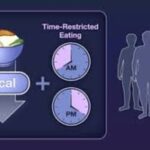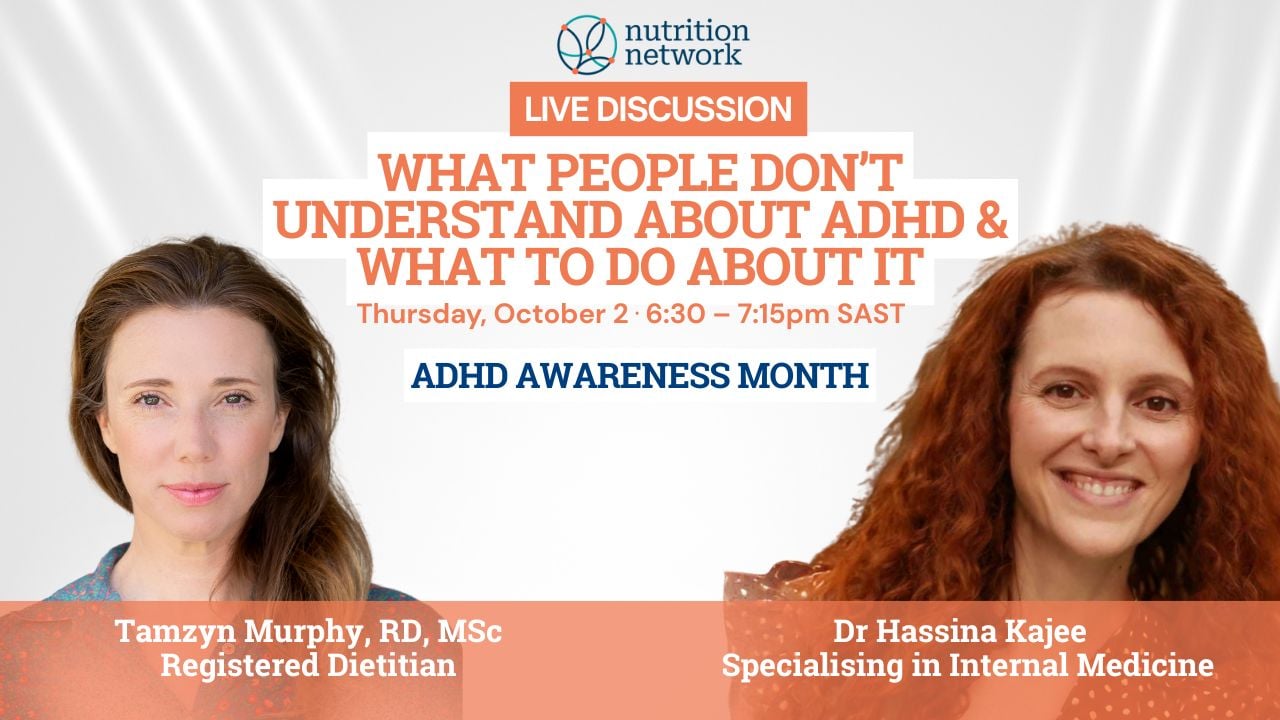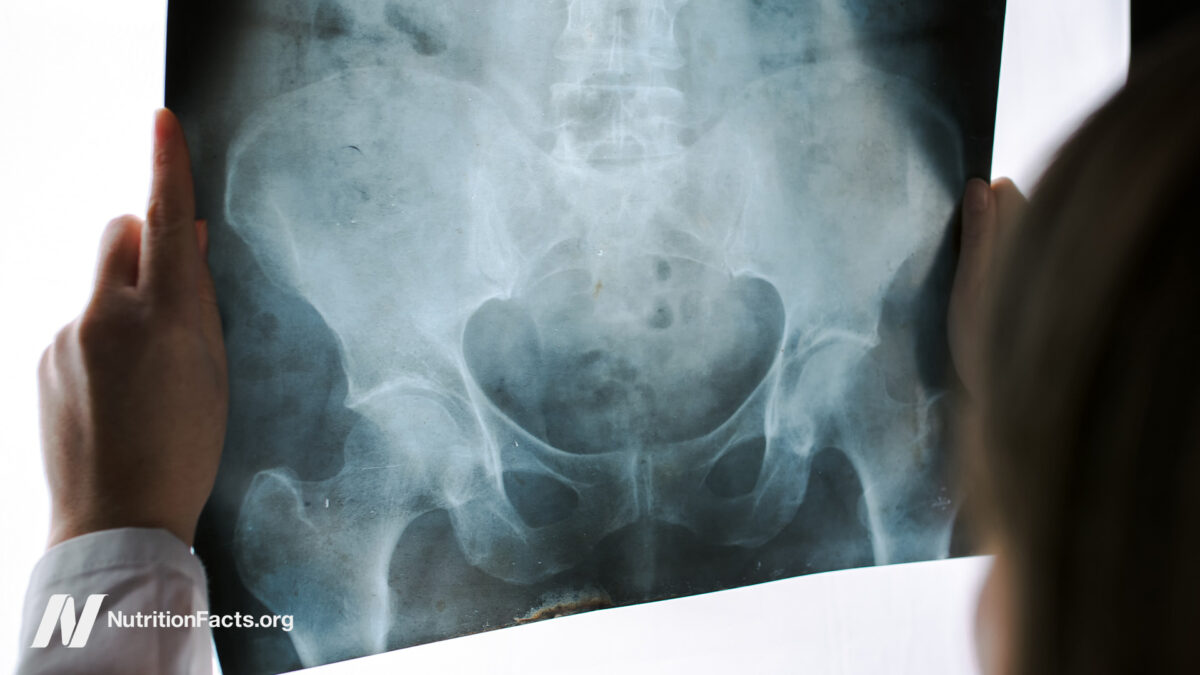Reviewed by Tamzyn Murphy, RD, MSc
October is ADHD Awareness Month — a perfect time to pause and reflect on how much of what we assume about ADHD is incomplete, oversimplified, or outright wrong. In our recent Live conversation with Julie Saad, we aimed to push beyond the standard script—beyond “dopamine deficiency” and “take Ritalin”—to open up new windows of possibility.
Julie is a Nutrition Network Practitioner, an ADHD coach, and someone who has been living and breathing the intersection of metabolism, neurology, and ADHD. As she puts it, “I went on a diet to lose weight and accidentally fixed my brain.”
“What we’re seeing more and more … is that the real question shouldn’t be what’s wrong with this brain … but why is this particular brain struggling so much?”
That shift—“why is this brain struggling?”—is at the heart of a more generative, hopeful conversation about ADHD. Below is a deep dive into that conversation: what we believe now, what we don’t yet know, where the science is pointing, and what clinicians, parents, and individuals can do now.
Rethinking the Standard Narrative
The “default story” of ADHD is very familiar:
- You’re born with it, it’s chronic, and your only hope is symptom suppression via medication (stimulants, non-stimulants).
- Behavior management, structure, timers, therapy—sure, they help, but they rarely get to root causes.
- The brain is “off”—some chemical deficit or wiring issue that needs “fixing.”
Julie challenges that:
“Turning our attention to metabolism … we find we actually have a lot more power over the symptoms of ADHD than we were initially led to believe.”
That’s a provocative statement. It doesn’t promise a cure, but it opens the possibility that ADHD is, at least in part, a problem of energy, fuel, and regulation—not just structure, willpower, or behavior.
Below are some of the key biochemical, metabolic, and neurological threads that make her case.
The Metabolic Landscape: Fuel, Glucose, and the Starving Brain
1. Evidence of altered cerebral glucose metabolism in ADHD
One of the most consistent findings in older neuroimaging literature is that adults with hyperactivity (i.e. ADHD) show lower global glucose metabolism compared to controls. In one landmark PET study:
“Results: Global cerebral glucose metabolism was 8.1 percent lower in the adults with hyperactivity than in the normal controls.” (Zametkin AJ et al., 1990)
This study also showed reduced glucose uptake in prefrontal regions — areas critical for attention, executive function, impulse control — consistent with hypotheses about “frontal deficit” in ADHD.
And this study is not alone. A review of ADHD models points out:
“There is reduced glucose metabolism in the prefrontal cortex of adults with ADHD, consistent with a loss of frontal control mechanisms.” (Johnson RJ et al., 2011)
In adolescence, too: one small study of girls with ADHD vs controls showed lower cerebral metabolic rates for glucose in certain brain regions for the girls with ADHD (but not an overal lower cerebral glucose metabolism – suggesting a role for age and possibly sex. (Ernst M et al., 1997)
Put simply: there is credible evidence that certain brain areas in ADHD may be functioning with reduced glucose uptake or utilization. That suggests a “fuel crisis” in the regions that need it most.
2. Why is glucose metabolism impaired? Mitochondria, insulin resistance, and oxidative stress
If glucose uptake is low or inefficient, the brain may go into a sort of energy starvation. But how would that happen? Some possible mechanisms:
- Mitochondrial dysfunction: If mitochondria are less efficient, even normal glucose can’t be fully converted into usable ATP (energy).
- Insulin resistance / transporter dysfunction: Glucose uptake into neurons depends on transporter systems (e.g. GLUTs). If those are blunted—or insulin signaling at neural or blood-brain-barrier levels is impaired—the brain may not receive its needed fuel.
- Oxidative stress & inflammation: These disrupt cellular machinery, damage mitochondria, and impair neurotransmitter pathways. As Julie explained,
“Oxidative stress … throws a wrench in the machine. You’re going to get all sorts of misfiring and misfunctions.”
In neurobiology, oxidative stress can degrade neurotransmitters, upregulate glutamate (excitation), downregulate GABA (inhibition), and destabilize neuronal networks.
As a result, there’s a constellation of effects: poor energy, neurotransmitter dysregulation (dopamine, norepinephrine, serotonin, glutamate), and local underfunction in key brain hubs.
3. Fluctuations & instability: How glucose swings may feed ADHD symptoms
Even if baseline glucose metabolism is affected, what if fluctuations—peaks and troughs—are part of the problem? Some researchers posit that the brain of someone with ADHD is more vulnerable to glucose instability. In practice:
- A post-meal glucose spike may overstimulate neural networks (hyperactivity, restlessness).
- A post-spike crash may lead to “brain fog,” inattention, fatigue.
- The neural circuits in attention/executive control may not tolerate energy variability well, thus tipping more easily into dysregulation.
As one commentary puts it: “Fluctuations in brain glucose levels can profoundly impact attention … the neural circuits responsible for sustained attention may be compromised … leading to increased distractibility and reduced task persistence.” (Meyer HR, 2024. ADD Resource Center)
Together, these threads suggest ADHD is not just a “dopamine problem” but a metabolic regulation problem — the brain is struggling to fuel itself and stay stable under fluctuating demand.
The Role of Ketogenic & Low-Carb Approaches
If the brain struggles with glucose, what alternatives exist? Enter ketones.
Mechanistic rationale: Ketones as alternate brain fuel
When carbohydrate intake is low, the liver produces ketone bodies (notably beta-hydroxybutyrate, BHB), which can cross into the brain and be used as energy. Ketones are often touted as “cleaner fuel” — they generate fewer reactive oxygen species, stabilize mitochondrial function, and provide steadier energy.
In theory, by shifting brain metabolism from glucose to ketones (or partially ketones), one might:
- Bypass defective glucose uptake or transporter limitations
- Provide a more stable, efficient energy supply
- Reduce oxidative stress and inflammation
- Stabilize neurotransmission (balance glutamate/GABA, protect dopamine pathways)
In other neurological and psychiatric conditions, ketogenic diets have already shown promise:
- In epilepsy, ketogenic diets are well established and sometimes lead to 50–90% seizure reduction.
- In psychiatric contexts (bipolar, schizophrenia, depression), pilot studies show mood stabilization, reduction of symptoms, and improved metabolic health. (Sethi S et al., 2024)
- A case series found that ketogenic therapy improved both depression and anxiety in individuals with major mental illness. (Calabrese L., 2024)
Animal & preclinical ADHD / hyperactivity models
There are rodent models (notably the spontaneously hypertensive rat, SHR) used as proxies for ADHD. One animal study showed:
“KD could relieve behavioral symptoms of ADHD in SHR, increase neurotransmitter expression, and increase protein … microbial diversity clearly enhanced after KD … KD treatment may lead to a loss of dominant populations … support the survival of more rare populations.” (Liu Y et al., 2023)
In that study, ketogenic diet partially reversed microbiome alterations seen in SHR and improved behavioral markers.
Other rodent PET imaging work in attention models shows that glucose metabolism in attention circuits is closely correlated with behavior. (Xi W et al., 2013)
Human & clinical evidence (limited, cautious)
Here’s where we must temper enthusiasm with responsibility: the human evidence for keto in ADHD is extremely limited and preliminary. A lot more research is needed before we can confirm whether Julie and her client’s amazing outcomes on a ketogenic diet can be replicated in other adults, and perhaps more contentiously, in children.
- Clinical evidence into a ketogenic diet and ADHD comes from case reports trialling ketogenic diets for epilepsy, ADHD symptoms were secondary outcomes, and results are mixed and difficult to interpret. (Omorie NE et al., 2024).
- A broader review of ketogenic and exogenous ketone use in neuropsychiatric disorders notes that ADHD evidence is less compelling than for ASD or epilepsy, largely due to small sample sizes, inconsistent biochemical verification, and lack of long-term follow-up. (Omorie NE et al., 2024).
- More broadly, articles caution that while the mechanism is appealing and early studies promising, the clinical trials in psychiatry are still in their infancy. (Yousufzai W et al., 2025).
- That said, doctors and researchers (e.g. at University of Oxford) are now planning RCTs to test keto in ADHD and depression. (Metabolic Mind, YouTube).
Bottom line: ketogenic strategies are a promising “off-label” frontier in ADHD care, with exciting reports for dramatic improvement and even remission from ADHDers. But ketogenic diets and metabolic strategies are not yet standard of ADHD care, and should be approached under clinical supervision.
From Theory to Practice: What Julie Saad (NNP) Sees in Her Work
One of the most compelling parts of the Live was hearing Julie’s practical, real-life experience. Her approach offers a model for how to bridge theory and real people.
The “accidental” beginning
Julie’s story is powerful in its humility and surprise:
“I went on a diet to lose weight and accidentally fixed my brain … the weight just started falling off … I woke up feeling refreshed … my lifelong PMS … went away.”
She didn’t set out to treat ADHD with keto — it emerged from her own experimentation. But once she saw the consistent changes, she dove in scientifically and clinically.
Focusing on therapeutic ketosis and measurement
Julie emphasizes that in her mental-health / ADHD work, she wants measurement and intentional ketosis:
“Our main focus is going to be getting that person into a sustainable relatively high level of ketosis … we need to know if it’s working. … We don’t want to just guess.”
She recommends aiming for 1.5 to 3.0 mmol/L of beta-hydroxybutyrate (BHB) in blood, measured via devices like Keto Mojo or equivalents.
She acknowledges nuance: “Everybody has kind of a magic number … mine is 2.0. When it’s 2.0, I can magically sit in a chair.” And she cautions that many individuals overshoot protein, which interferes with elevated ketone levels: “It is usually that you are eating too much protein … cut it down.” Julie writes patient menus, guides fat/protein/carb ratios, helps clients adjust, and tracks progress.
Holistic pillars beyond diet
Diet and ketosis: central. But Julie is clear that no single intervention suffices.
She names these other pillars:
- Sleep:
“I consider my ADHD in remission. If I have a bad night’s sleep, I’ll be jumping around the house like a rabbit.” In her view, poor sleep immediately destabilizes focus and executive control—like throwing water on a small fire and making it wildfire. - Stress management, mindset, and ADHD shame
She describes how internalized shame — the voice that says “I’m lazy, I’m broken” — can slow progress: “Getting rid of the ADHD shame … studies have shown that those of us with ADHD … grow up hearing more negative messages.” By helping clients reframe their self-narrative, she allows them to work from a place of strength rather than self-loathing. - Behavioral coaching, structure, accountability
The coaching component is not “soft” — it’s essential. Teaching routines, scaffolding executive function, gradually layering demand, and integrating nutritional interventions into everyday life is how change sticks.
Julie’s philosophy: start strong, aim high, measure, then fine-tune. You don’t weaken the intervention out of fear, you strengthen the support around it.
What We Can Do Right Now (While Waiting for More Data)
If you’re a parent, clinician, or individual exploring this path, here are responsible, science-minded steps to take now:
- Baseline labs + metabolic assessment
- Fasting glucose, insulin, HOMA-IR
- Lipids, liver panel
- Inflammatory markers
- Possibly advanced assessments (e.g. mitochondrial panels)
- Cognitive baseline tests for attention, executive function
- Diet adjustment with support, not dogma
- Begin with a low-carb, more stable blood glucose approach (not necessarily full keto)
- Monitor for side effects
- Use biomarkers (i.e. BHB, glucose) not guesswork
- Adjust protein/fat/carbs for individual response
- Sleep hygiene & circadian regulation
- Prioritize consistent sleep timing, dark bedrooms, wind-down routines
- Optimize melatonin, avoid late light exposure, manage stress
- Movement, intermittent fasting, and time-restricted eating
- Gentle movement (walking, stretching) helps insulin sensitivity and mood
- Fasting windows (if safe) may help metabolic flexibility
- Mindset & internal narrative
- Work on self-compassion, shame reduction, cognitive framing
- Coaching or therapy can help disentangle internal critic voices
- Careful use of nutritional supplements (only when evidence supports)
- Magnesium, zinc, omega-3s, B-vitamins, etc. — but only when indicated
- Monitor interactions, safety, and clinical signs
- Collaboration, not fragmentation
- If someone is already on stimulant or non-stimulant meds, aim for integrative, not antagonistic, strategies. Consult with a medical doctor to manage medication.
- Monitor side effects, potency, and interactions
- Use nutrition and coaching to complement (not replace) standard care, unless safely managed by clinical experts
- Documentation & measurement
- Track symptoms, focus, mood, side effects
- Correlate with ketone levels, glucose trends
- Adjust iteratively
- Clinician education & supervision
- If you’re a clinician, pursue advanced metabolic/neurology training
- Seek supervision when venturing into dietary or neurologic interventions
Common Objections & Cautions
To be intellectually honest, here are some objections and cautions worth raising:
- Insufficient human RCT data
The majority of positive findings are in animals or small, uncontrolled human case series. There is not yet strong clinical trial evidence that keto consistently improves ADHD symptoms. (Bostock ECS et al., 2017) - Adherence & quality of life
Optimal ketogenic diets can be restrictive, socially challenging, and burdensome — which may reduce long-term adherence. - Side effects & safety
Some individuals may experience electrolyte imbalances, nutrient deficiencies, gastrointestinal distress, or dyslipidemia. Especially in children or special populations, clinical oversight is essential. - Heterogeneity of ADHD
ADHD is not one unified disorder. There are subtypes (inattentive, hyperactive, combined), and people differ in comorbidities (anxiety, mood, learning differences). Keto may help some subtypes more than others. - Interpretation bias & confirmation bias
When someone expects ketones to help, subtle improvements may be over-attributed. That’s why measurement, controlled trials, and skepticism are crucial. - Not a substitute for comprehensive care
Diet is a powerful tool, but not magic. Sleep, therapy, medical evaluation, and psychosocial support must be part of the picture.
Why This Matters: Hope, Agency & Reframing ADHD
One of the most compelling things about this new paradigm is the message embedded in it: ADHD is not a life sentence of defeat. It is not just a “brain glitch” you resign to. It has root causes you can influence. By shifting from spectator (diagnosis) to participant (intervention), people change trajectories.
As Julie said:
“Maybe I would say, ‘You’ll find your way and … there are solutions to this … you’re going to figure it out … we’re kind of like gemstones. If you throw a bunch of mud on us … but if you clean us up and shine a light on us, you’d be really amazed.’”
Let that imagery carry you. Your brain, your child’s brain, your client’s brain — it’s not irredeemably “defective.” It’s a complex system that often thrives when given better fuel, rest, regulation, and structure.
How to Go Deeper — NN Trainings & Pathways
If this conversation resonated, here are some next steps:
These training paths are how we build a new generation of clinicians versed not just in pills and protocols, but in root-cause, metabolism-aware care.
In Closing
ADHD is far more than what we see at the surface. It is not just behavior or dopamine; it is metabolism, neural energy, stress regulation, structure, and self-narrative. We are still in the early days of research around ketogenic or low-carb strategies for ADHD. But the conceptual shift — from symptoms to system, from blame to possibility — is already powerful.
This ADHD Awareness Month, let’s expand how we see ADHD—not just as a challenge, but as a signal that deeper pathways of healing exist. Choose curiosity over judgment, evidence over dogma, measurement over speculation. Illuminate the brain with better fuel. And, as Julie would say, clean off the mud and let the gemstone shine.
If you’re a practitioner, parent, or person with ADHD eager to go deeper, join us on these training journeys and build not just better care for others—but better care for your own brain, too.
ADHD is far more than what we see at the surface. It is not just behavior or dopamine; it is metabolism, neural energy, stress regulation, structure, and self-narrative. We are still in the early days of research around ketogenic or low-carb strategies for ADHD. But the conceptual shift — from symptoms to system, from blame to possibility — is already powerful.
In other neurological and psychiatric conditions, ketogenic diets have already shown promise:
- In epilepsy, ketogenic diets are well established and sometimes lead to 50–90% seizure reduction.
- In psychiatric contexts (bipolar, schizophrenia, depression), pilot studies show mood stabilization, reduction of symptoms, and improved metabolic health. (Sethi S et al., 2024)
- A case series found that ketogenic therapy improved both depression and anxiety in individuals with major mental illness. (Calabrese L., 2024)
This ADHD Awareness Month, let’s expand how we see ADHD—not just as a challenge, but as a signal that deeper pathways of healing exist. Choose curiosity over judgment, evidence over dogma, measurement over speculation. Illuminate the brain with better fuel.
If you’re a practitioner, parent, or person with ADHD eager to go deeper, join us on these training journeys and build not just better care for others—but better care for your own brain, too.









